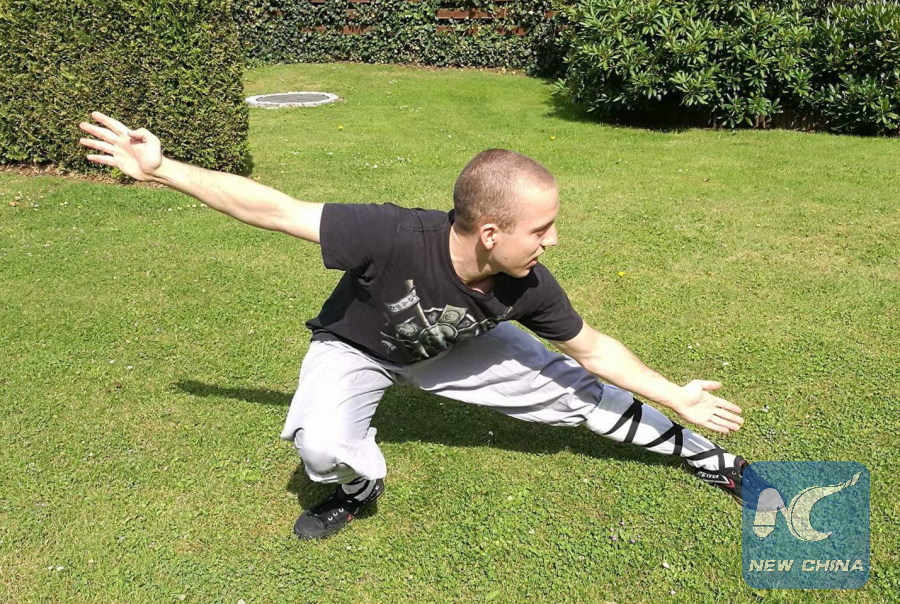
Danish student Troels Jeppesen practices Kung Fu.(Photo by Ying Chen)
By Ru Ge
Among the many Danish friends that I have made during my seven months of study as an exchange student in Denmark are several who have really impressed me with their profound interest in and deep love of Chinese culture.
Troels Jeppesen, who majors in Chinese studies in Copenhagen University, is a huge fan of Shaolin martial arts. He has been practicing Kung Fu for three years since he graduated from his gymnasium (Danish name for high school).
"I've never been to Shaolin Temple, but I have a Danish master who had studied martial arts at the temple multiple times over a period of four or five years. So he is very skillful at Kung Fu, and passed on the teachings to his Danish students," he said.
Jeppesen can talk about Kung Fu moves like a real expert: from 18 Luohan Hands (Luohan means warrior monk) to Wuxingbafa, or Five Animals and Eight Methods (the Kung Fu moves that imitate animals).

Jeppesen's love of martial arts was the reason he chose Chinese studies as his major. (Photo by Ying Chen)
In his opinion, 18 Luohan Hands and Wuxingbafa are two sides of the same coin.
The former is more related to bodily exercises, whereas the latter is more about imitating animals and their movements. He explained to me that there are five imitation forms included in Wuxingbafa: tiger, crane, leopard, snake and dragon.
He also said that in the later development of Shaolin Kung Fu, people also started imitating weather, water, thunder, and rivers. I almost feel ashamed that a foreigner knows so much about Shaolin martial arts, while a native Chinese like myself - born and brought up in the country - knows comparatively little about this important part of Chinese culture.
In addition to explaining the movements of Shaolin Kung Fu to me, he also mentioned that his love of martial arts was the reason he chose Chinese studies as his major when he entered Copenhagen University.
"It's a long story, but put it more simply, it's because my Kung Fu master is good at telling stories, and I found out the ideas and philosophical views are very different from what we have here in the west," he said. Because of that, he became very interested in Chinese culture and decided to major in Chinese.
In the upcoming semester, he is going to study Chinese for five months at Beijing International Studies University as an exchange student and he said he would definitely go to visit Shaolin Temple in Henan Province in central China.
Another student is so passionate about Chinese culture that he asked to be called Song Jiang, a hero in the ancient Chinese novel of "Outlaws of Marsh." The tall, blond 27-year-old is nothing like the dark-complexioned leader of outlaws. Song studied Chinese for four years as his major and just graduated from Copenhagen University. I met him twice at a "speak in Chinese" café. He speaks almost flawless Chinese and is a voracious reader of ancient classical Chinese literature, with his favorite books being "Romance of the Three Kingdoms" and "Outlaws of Marsh." He has an ambition to translate these two novels into Danish in collaboration with an even more knowledgeable friend who also majored in Chinese studies. "I hope one day I can introduce the marvelous ancient Chinese culture to Danish people by translating the Chinese classical works into Danish," he said.
One interesting fact about Song is that I can tell he definitely reads a lot of classical works. Sometimes, when speaking Chinese, he uses ancient words instead of the ones we use nowadays. Take, for example, the word "pirate." We usually call it "haidao," but he used an ancient version: "haikou" instead. This is a word that was used in the Song and Qing Dynasties.
In addition, whenever I mentioned unique Chinese phenomenons and expressions, they resonated with him really well. When we talked about the Chinese phenomena of "dama" (Chinese aunties) or "xueba" (literally "academic emperor", a term that labels nerds, bookworms and all students that study excessively), he laughed and nodded.
He also showed off his knowledge of the Chinese accent, imitating Chinese people speaking English with strong Chinese accents. I couldn't help laughing because his skill of mimicking was quite sharp and he sounded exactly how some Chinese sound when they speak English.

"Speak Chinese cafe" in Copenhagen University.(Photo by Ying Chen)

Students speak Chinese in Copenhagen University. (Photo by Ying Chen)
These are just two examples of Danes who are really in love with Chinese culture, and there are also many others who have developed similar hobbies and passions related to Chinese arts and culture. I've seen a senior Danish artist who has mastered Chinese calligraphy (even more so than many Chinese) and some Danish students who are really good at making dumplings. Whenever I encounter these people, I marvel at the depth of shared human experience that can bridge the divide between cultures and peoples. It makes one feel quite proud. Chinese culture and history have made - and will continue to make - a profound impact on the world.

